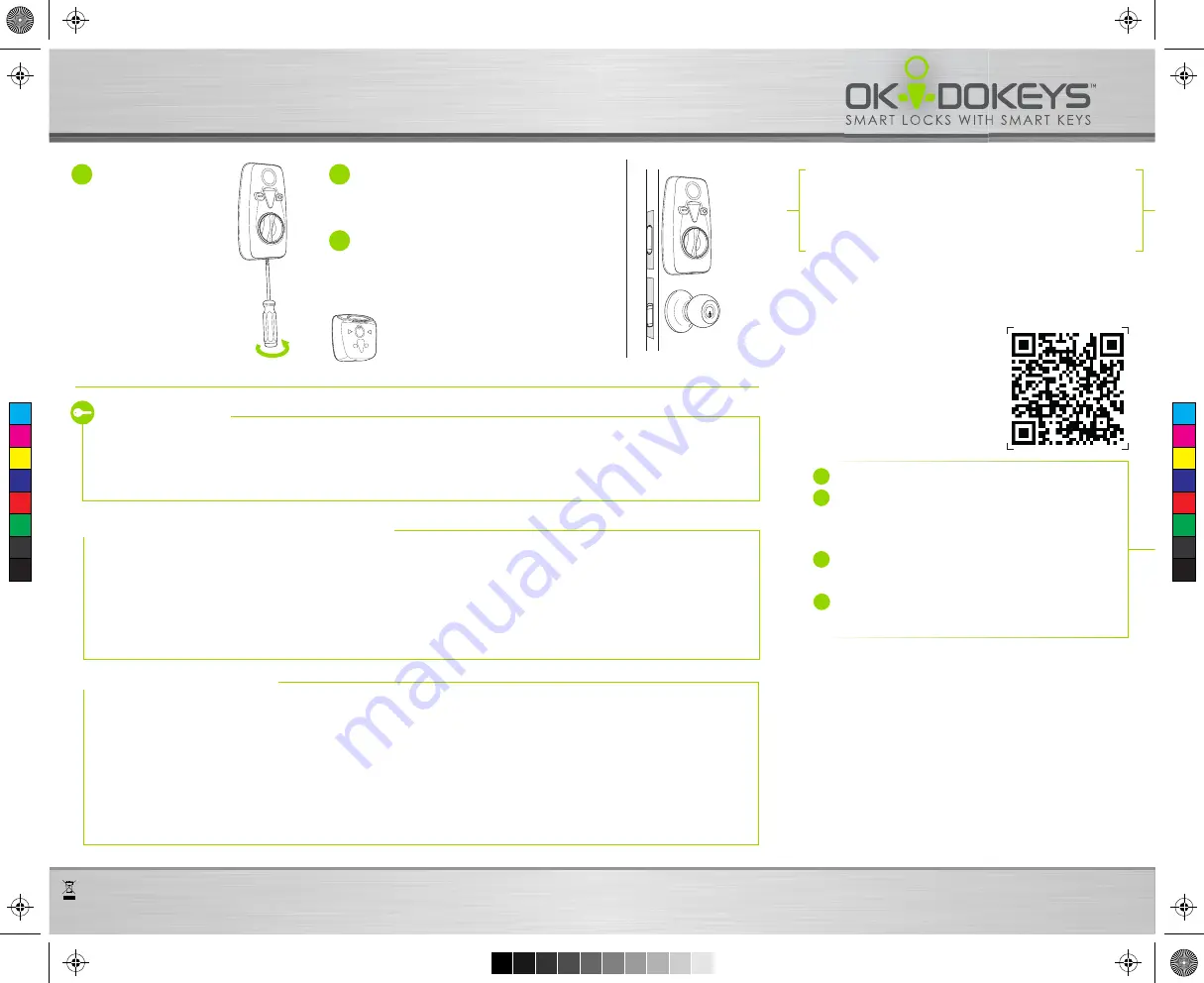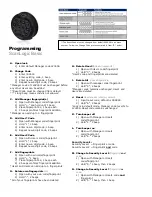
Technical Support:
support@okidokeys.com | 888-853-2309
Learn More:
www.okidokeys.com
Register and Sign In:
portal.okidokeys.com
11
12
13
You can view the OKIDOKEYS Smart-Lock
installation video online at:
www.okidokeys.com/installation,
or scan the QR code.
IMPORTANT:
Before you begin the Smart-Lock installation,
ensure that your existing deadbolt engages
freely into the locked position. You should not
have to push, pull, or force the existing deadbolt
into position. If the deadbolt does not engage
freely into position, make the necessary adjust-
ments according to your existing deadbolt instal-
lation instructions.
Once the existing deadbolt engages freely into
the locked position, you are ready to begin
installing your Smart-Lock system.
1
- Install your Smart-Lock
2
- Create your account on
portal.okidokeys.com
and register
your Smart-Lock
3
- Create users and assign them to
your Smart-Lock
4
- Install the OKIDOKEYS App and
synchronize your Smart-Lock
The installation process is complete.
You are now ready to register your
Smart-Lock online.
If you purchased a Smart-reader,
please install it before going through
the registration process.
Create your account at:
https://portal.okidokeys.com
Register your Smart-lock according
to the online instructions.
Insert and tighten the
T-10 (Torx) screw in the
bottom of the
Smart-Lock cover.
Note:
This screw is not
mandatory, but it
protects against
undesired access to
the inside of the lock.
Keep batteries away from children. • Do not mix old and new batteries or alkaline, standard, or rechargeable batteries. • Replace batteries when any function fails to operate. • Do not dispose of product or batteries in fire.
Do not dispose of in household waste. Batteries contain substances that can be damaging to the environment and health. Contact local authority for recycling or collection information.
© 2014, Practical House. All rights reserved. Under the copyright laws, this document may not be copied, in whole or in part, without the written consent of Practical House. The Practical House and Okidokeys names and Okidokeys logo
are trademarks of Practical House. U.S. Patents 8,565,725 and 8,620,268; other patents pending in the US and in other countries
SMART-LOCK
INSTALLATION GUIDE
If you need further assistance, let us help.
You can find additional help and information at our OKIDOKEYS support forum at:
support.okidokeys.com
For additional support, returns, or questions, please contact us through any of the following methods (all times are Eastern Time)
Visit our website:
www.okidokeys.com
Call:
888-853-2309 | Monday–Friday 8 a.m. to 8 p.m. | Saturday 10 a.m. to 4 p.m.
Email:
support@okidokeys.com
Your existing metal keys are still working with your new OKIDOKEYS Smart-Lock. To achieve this, your Smart-Lock motor will
operate some cycles after each locking or unlocking, to reach its original position and be ready for next move.
The motor is also programmed to reposition your Smart-Lock to its previous position (locked or unlocked) in case of incomplete
manual operation. In this case, you will hear a sound and the motor moving.
Your metal keys.
Modification statement:
Practical House has not approved any changes or modifications to this device by the user. Any changes or modifications could void the user’s authority to operate the equipment.
Interference statement:
This device complies with Part 15 of the FCC Rules and Industry Canada licence-exempt RSS standard(s). Operation is subject to the following two conditions: (1) this device may not cause interference, and (2) this
device must accept any interference, including interference that may cause undesired operation of the device.
Wireless notice:
This device complies with FCC/IC radiation exposure limits set forth for an uncontrolled environment and meets the FCC radio frequency (RF) Exposure Guidelines and RSS
‐
102 of the IC radio frequency (RF) Exposure
rules. This transmitter must not be co-located or operating in conjunction with any other antenna or transmitter.
FCC Class B digital device notice:
This equipment has been tested and found to comply with the limits for a Class B digital device, pursuant to part 15 of the FCC Rules. These limits are designed to provide reasonable protection against harmful
interference in a residential installation. This equipment generates, uses and can radiate radio frequency energy and, if not installed and used in accordance with the instructions, may cause harmful interference to
radio communications. However, there is no guarantee that interference will not occur in a particular installation. If this equipment does cause harmful interference to radio or television reception, which can be
determined by turning the equipment off and on, the user is encouraged to try to correct the interference by one or more of the following measures:
- Reorient or relocate the receiving antenna.
- Increase the separation between the equipment and receiver.
- Connect the equipment into an outlet on a circuit different from that to which the receiver is connected.
- Consult the dealer or an experienced radio/TV technician for help.
CAN ICES-3 (B) / NMB-3 (B):
This Class B digital apparatus complies with Canadian ICES-003.
FCC/IC Regulatory notices.
C
M
Y
CM
MY
CY
CMY
K
Smart-Lock Installation Guide V10.pdf 1 11/4/2014 12:05:48 PM




















